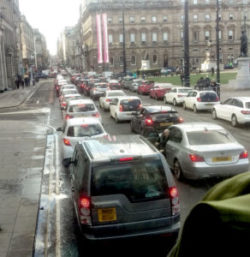
Glasgow’s Low Emission Zone would be a ‘No Ambition Zone’
Low Emission Zone proposals for Glasgow, published today, have been slammed by Friends of the Earth Scotland for failing to deliver the clean air that is legally required in the city and failing to deliver on SNP national and local manifesto commitments.
- Glasgow City Council’s LEZ proposals would only apply to 20% of buses by the end of 2018.
- There would be no signs to show the zone exists and no cameras to catch offenders
- Glasgow has illegal and unsafe levels of air pollution and failed to meet an EU clean air deadline of 2010.
Friends of the Earth Scotland Air Pollution Campaigner Emilia Hanna, said:
“The people of Glasgow were promised a Low Emission Zone, but these proposals will create a ‘No Ambition Zone’ that does almost nothing to speed up air quality improvements so desperately needed in the city.
“The proposals condemn Glasgow to illegal air for years to come and must be urgently improved. Councillors must recommend these proposals be significantly improved when they discuss them next week or they will have failed the people of Glasgow who suffer daily from the health impacts of air pollution. What Glasgow does also sets the benchmark for the LEZs to come in Aberdeen, Dundee and Edinburgh in 2020, so it is critical to set the bar high.
“A Low Emission Zone should keep polluting vehicles out of the most polluted places. This plan is even worse that initially envisaged, not only will the Zone fail to catch dirty vans and lorries but it will only apply to a tiny fraction of buses. A Low Emission Zone which has no signs to mark it, no new cameras to catch offenders and continues to allow almost every dirty vehicle into the city centre, is not a Low Emission Zone. The bus industry and the dinosaurs at Government agency Transport Scotland have succeeding in making sure the Glasgow LEZ proposals will fail to achieve clean air by 2020, the Scottish Government’s target date for compliance with safety standards.
“The LEZ plans would require a mere 20% of buses to have the cleanest standards in the city centre by next year, yet Transport Scotland research shows that 15% of buses already were at this standard in 2017. The plans are a gift to bus companies at the expense of the hundreds of people in Glasgow who are dying early every year and suffering ill health due to toxic fumes. The bitter irony is that the Scottish Government has already allocated more than £10m for developing LEZs and at least £10m in loans for companies to buy cleaner buses, which is enough to retrofit or replace every older bus in Glasgow by the end of 2018. The Council must be bolder and reform its proposals to require that 100% of buses travelling through Glasgow City Centre are Euro 6 compliant by the end of the year.
Hanna continued,
“These draft plans have also failed to publish a clear timescale for including vans, lorries, cars and taxis in the zone, but suggest that no action will be taken against the most polluting of these vehicles for up to four years, kicking the issue of tackling air pollution into the long grass when all the while people continue to die early and suffer ill health.
ENDS
Notes to Editors
- Link to LEZ Update report which will be discussed at Glasgow City Council’s Environment, Sustainability and Carbon Reduction Policy Committee on Tues 20 March http://www.glasgow.gov.uk/councillorsandcommittees/viewDoc.asp?c=P62AFQDN2U2UUTDN2U
- LEZs were first proposed in 2015, the SNP 2016 Scottish Election manifesto promised a Low Emission Zone by 2018. In September 2017 the Government confirmed the first LEZ would be in Glasgow and there there would be further Zones in Aberdeen, Dundee and Edinburgh by 2020.
The Glasgow SNP promised an LEZ for the city in their 2017 council election manifesto stating: “An SNP City Government will establish Scotland’s first Low Emissions Zone in Glasgow, beginning in the most polluted parts of the city centre but with the aim of expanding to other parts of the city with a record of high emissions. We will work with bus operators to refresh their Statutory Quality Partnership with the City Council, with a renewed focus on removing the most polluting diesel buses from our streets and replacing them with greener vehicles, and we will review traffic management in the city centre with the aim of significantly reducing congestion. We will encourage increased use of electric vehicles and ensure this is supported by our traffic management and parking regulations.” - In this year’s budget the Scottish Government have committed £10.8m for LEZ delivery and at least £10m for loans to buy cleaner buses. Retrofitting an older bus to modern emissions standards involves only changing the exhaust system and in London this costs only £15,000 per bus.
- A report commissioned by Transport Scotland estimates that there are just over 800 buses in Glasgow, and approximately 15% of these (125 buses) were already Euro 6 in 2017. 83% of the buses are Euro 3,4, or 5 (677) which can all have new exhaust systems retrofitted. 677 buses could be retrofitted at a cost of £10.2m. [Report available on request]
- The City Council agreed in September that within 6 months a report would include “specific draft proposals and timescales to include vans, lorries and taxis”: http://www.glasgow.gov.uk/councillorsandcommittees/viewDoc.asp?c=P62AFQDNDNNTZLDX81
- FoES briefing on LEZs: https://foe.scot/campaign/air-pollution/what-is-a-lez/
- Friends of the Earth Scotland is
* Scotland’s leading environmental campaigning organisation
* An independent Scottish charity with a network of thousands of supporters and active local groups across Scotland
* Part of the largest grassroots environmental network in the world, uniting over 2 million supporters, 75 national member groups, and some 5,000 local activist groups.
www.foe.scot
